Movie Buzz Hub
Your go-to for authentic fan voices on what’s worth watching now.
Fan Favorites
These films are lighting up the fan radar — see what’s trending now!
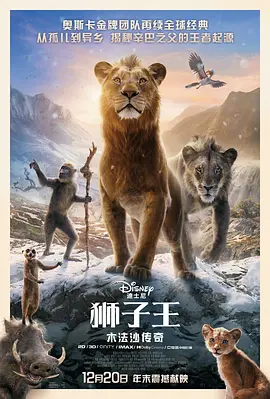
Mufasa: The Lion King
Director: Drama, Animation, Musical, Fantasy, Adventure
Cast: Aaron Pierre, Kelvin Harrison Jr., Tiffany Boone Mads Mikkelsen, Preston Nyman, More...
The film tells the story of how Simba's father, the young Mufasa, and his brother Taka (Scar), met a group of outstanding companions with different personalities long before Simba was born, and embarked on an adventure to find the Kingdom of Glory together. The film will reveal the origin stories of the two lion brothers, the wise mandrill wizard Rafiki, the confident and brave lioness Sarabi, and the nagging red-billed hornbill Zazu, and show how they face the many tests from their enemies, companions, and their hearts. This journey of fighting against fate across the vast grassland is destined to create a great lion king, and will also witness the tragic fate of a pair of brothers turning against each other, and finally compose the legend of the endless glory of the land, once again knocking on the eternal theme of the cycle of life.
Read Full Review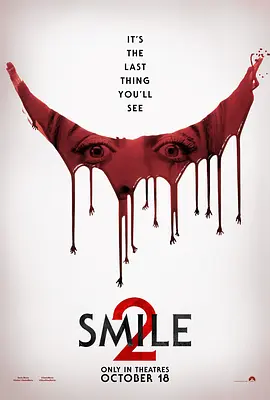
Smile 2
Female singer Skye Riley (Naomi Scott) went to her friend's house to get medicine for back pain, but she witnessed her friend's brutal suicide. A few days later, all kinds of strange phenomena made Skye crazy, and her relatives and friends around her smiled at her strangely. Day by day, Skye realized that she was infected with the smile curse, and none of the victims survived for a week. Skye could only seek help from Maurice (Peter Jacobson), a doctor who pretended to die...
Read Full Review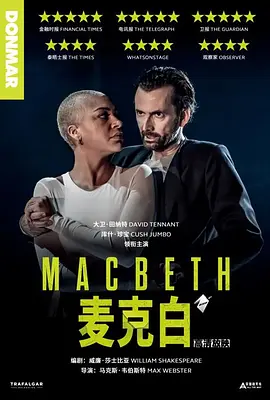
Macbeth
This version of Macbeth is directed by Max Webster (Life of Pi). When the audience takes their seats, they wear headphones, and the ambient sound effects are played in the headphones in the form of 3D sound effects, creating an uneasy and terrifying atmosphere. The sound effects heard by the live audience from the headphones will also be mixed into the soundtrack of the video version.
Read Full ReviewAll Fan Reviews
Every opinion matters. Dive into diverse, spoiler-free reactions for every film.

Mufasa: The Lion King
Director: Drama, Animation, Musical, Fantasy, Adventure
Cast: Aaron Pierre, Kelvin Harrison Jr., Tiffany Boone Mads Mikkelsen, Preston Nyman, More...
User Rating: 6.6/10 (30059 votes)
"The Legend of Mufasa" is the prequel to "The Lion King", telling the story of Simba's journey to become king. Generally, films where the protagonist goes from being an inexperienced person to a perfect man need to be paired with a symmetrical character who is both evil and complex, otherwise it will seem old-fashioned and boring. Captain America needs the Winter Soldier, Thor needs Loki, Optimus Prime needs Megatron, Zhang Junbao needs Dong Tianbao... Mufasa is a classic epic hero who constantly demonstrates his bravery, wit, nobility and tenacity, and is unbiasedly following the path of growth as a great screen hero. And all the dishonorable but more chewy good scenes were left to his good brother Scar, or his original name, Taka. Some people say that this movie is more like a story about how Taka turned into Scar. But this statement is not correct. What is blackening? From the perspective of basic commercial film values, it means that a good person turns into a bad person, betraying and harming his former allies. But to describe Taka as evil is to underestimate him. From the beginning to the end, it was not a question of Taka getting better or worse, but that he never changed. He is not like the Winter Soldier who was once brainwashed into a minion of Hydra, nor is he like Loki who has been a harmful person since childhood but sometimes shows some friendship, and he is not like Megatron who would kill his old friend once he changed his mind. It seems that Taka's behavior is wavering. Sometimes he is overwhelmed by jealousy and wants to destroy himself along with the other, and sometimes he misses his old love and risks his life to save the other. It seems that what he wants is never fixed. But behind all the changes, what he really pursues, or the core desire that dominates him, has always been the same. He was once a prince of noble status, and his parents had high hopes for him to be the new king. They might have been able to see that he was not cut out for it, but they still taught, trained, demanded and expected this of him. However, no matter how hard he tried, Taka could not meet the expectations. He was like a mediocre student who always hovered in the middle of the class and knew better than anyone that it was impossible for him to be admitted to a prestigious university. Despite having such a strict father and such a well-mannered mother, Taka still did not show the qualities of an heir. When faced with the enemy, he abandoned his family and ran away in panic, which was the final conclusion of his talent. Fortunately, he made the right choice when he was young. He rescued Mufasa from the water and insisted on begging his parents to let them become brothers. From childhood to adulthood, Mufasa was the only lion who never put pressure on him, never embarrassed him, and allowed him to escape from his weakness. The torment he felt from wanting to live up to his parents' ideals but failing to do so was released through the joyful play of his brothers, which allowed him to maintain a minimum level of pride as a lion. But until his parents were killed, his tribe was destroyed, he embarked on the road of escape with Mufasa, and fell in love with the same girl, his only spiritual support began to collapse. Remember after he saved Mufasa from the cliff, he said to him: I saved you, won’t you say thank you to me? He needed this feeling of being needed so much, but in the subsequent journey, he had to face the ceiling of his potential again and again. He had to watch Mufasa, a homeless child with a far inferior background than him, who was gifted and constantly resolved crises along the way and outshined him time and time again. The lion in his heart was taken away, which was just the last straw that broke the camel's back for his emotional castle. His father's words "deception can also make a king" were just an excuse he used to exonerate himself. He betrayed his friends not out of jealousy or revenge for love. He just wanted to break free from the quagmire of inferiority and regain the little pride he had. When Taka betrayed Mufasa with a clear conscience, we realized that he had changed. His tone became calm, his eyes became firm, his head was no longer lowered, and his body was no longer hunched over. Taka, who was seen before, the one who spoke hesitantly, had an uncertain look, and always hid in the corner secretly tasting the bitterness of incompetence, suddenly disappeared. He's doing an evil and crazy thing, but this is the closest we've seen him be to a lion in a long time. He was finally no longer the poor guy who was outdone and needed credit, and he regained control of his own and others' destiny. With Taka's assistance, the evil lions followed, but when the final battle came, Taka changed sides and returned to Mufasa's camp. Because seeing Mufasa dying soon aroused a pleasure in Taka's heart that was stronger than betrayal: I am finally no longer a weakling. I have the ability to save you once again. Even if I lose my life, even if I am exiled by you, even if I am despised for the rest of my life, I don't care. The moment when Taka steps forward to rescue Mufasa and is left with a disfiguring scar, and when he grabs the drowning Mufasa and lifts him out of the water, these are his particularly charming moments, especially the latter scene, which echoes in the theater with loud musical notes, and its passion even surpasses the heroic moment when Mufasa kills his opponent. Rafiki said to Mufasa that your bloodline is not important, your character is important. And Taka's story is saying that your character is not important, what matters is whether you have the courage to face it and fight it. Many characters in this movie dream, and their dreams contain their ideals and future, but Taka never mentioned it. Does he dream? In the dream, he may not be the king and may not get love, but there must be countless scenes in which he fearlessly protects his brother and receives his sincere gratitude, just like when they first met. There is nothing dark about Taka's life, and I can't classify him as a villain in any sense of the word. He was a child who had never been satisfied and spent his entire life replicating the moment he was most proud of.
Read Full Review
Smile 2
Director: Suspense, Thriller, Horror
Cast: Naomi Scott, Rosemary DeWitt, Lucas Gage, Miles Gutierrez-Reilly, Peter Jacobson, More...
User Rating: 7.0/10 (37812 votes)
The series "Dangerous Laughter" has an interesting design: the identity of the heroine and the setting of the fake smile demon complement each other. In the first film, the heroine is a psychiatrist who wants to help patients, but cannot believe what the patients see; when she herself is haunted by evil spirits, she personally experiences this pain. In this film, the heroine Skye is set as a star who is the focus of everyone's attention. The ubiquitous fake smile has a double meaning: it is the illusion of evil spirits, and it is also her real situation. Although surrounded by applause, no one cares about herself behind the halo. In short, it is loneliness. Even if you are in a crowd, you will become a lone prey. Irony, which was just a spice in the first film, becomes very important in this one. The director seems to have deliberately emphasized this point, wanting to make this film profound. The most exquisite part is undoubtedly the dancing of smiling faces in the mansion on the eve of the tour; the horror atmosphere reaches its peak, and it also completely reveals the dilemma of the heroine. Her team and fans are just like these smiling phantoms, who come with smiles on their faces, but can only add fuel to the fire. Before Skye met Morris, it was also the fans who pushed her away from this last straw. After the "smiley dance", Skye went down all the way, rushing to the destined ending in the illusion. The director used the same trick again. The only friend Gemma who he trusted never appeared, and Morris who could help him was not real. When he opened his eyes, he was wearing clothes he didn't like, still standing on the tour stage, performing the most gorgeous suicide in the spotlight, and the spectators all became prey, and the irony was bursting out. This part of the plot is very similar to "Some Kind of Material", especially the monster that broke out of the body at the end. Whether in terms of characters, plot (second half) or theme, this work is like a sister film of "Something Substantial". The difference is that "Something Substantial" is an art film that focuses on satire, using horror elements to strengthen the expression; while "Smile 2" is a pure horror film that sublimates the theme. The design of this work is simpler and the satire is more direct. Although there is a slight disconnect between the beginning and the end, it is unexpectedly powerful. Which of the two works is better or worse is a matter of opinion. There is a small bug: one of the victims in the previous film was a professor who committed suicide in class, and only one of his students was infected. According to this inference, no matter how many people saw Skye's death, the fake smile demon can only infect one person. Thinking about it this way, the fake smile demon seems to have worked in vain. However, the ending is too shocking, so we should still ignore the imperfections in the setting.
Read Full Review
Macbeth
Director: Drama
Cast: David Tennant, Cush Jumbo, Moyo Akande, Annie Grace, Kaspar Nove, More...
User Rating: 7.7/10 (642 votes)
The short review says that Titi adds one star, the child adds one star, and the glass slapping adds one star. Then a friend who feels the same pointed out that the original play is only worth one star. Haha. Indeed. I was quite upset after watching it at that time. Although I had enough time to change the train from the last train to half an hour earlier because it was less than nine o'clock at the end, I still couldn't say its advantages. A few days after watching it, I was no longer as excited (unhappy) as I was at that time. I recorded it calmly. In two days, I really forgot everything. The dividing line of the full spoiler is to talk about the advantages first. Yes, this version also has advantages~ 1. Big Titi. Titi acted too well. Although the director and the actors on the same stage created many difficulties, she burst into light when she had the opportunity. For this reason, I will definitely recommend this version. The most impressive place is also one of the few places in this version of the play that makes people feel the connection between Macbeth and his wife. I think it was completely made up by Titi: the monologue after the servant reported the death of Lady Macbeth and Macbeth said, "She's dead, she's dead sooner or later." In other versions, this part usually only expresses Macbeth's indifference to human nature and his helplessness towards life and death at this point in the story, but Titti gave it a particularly fragile and melancholy tone, which makes people feel Macbeth's deep loneliness and helplessness after Lady Macbeth's death. It's like a eulogy for Lady Macbeth, which is an emotion I have never experienced before. Their connection is much deeper than I imagined. 2. There is a wonderful arrangement. At the banquet after Banquo's death, because the script directly wrote Banquo's ghost, basically every version also has a real ghost. But this version didn't have a person. In other words, most of what we saw before was from Macbeth's perspective, but this version gives us Lady Macbeth's perspective, the guest's perspective. This made me feel a sense of sudden realization, and I very intuitively experienced the dislocation between Macbeth and his wife, that is, Macbeth saw Banquo, and Lady Macbeth thought he saw Duncan. You can even imagine Macbeth seeing Banquo and Duncan, and imagine Lady Macbeth gradually realizing that he had killed Banquo, which gave a lot of space. 3. The child who played all the children is very good, and the future is promising. 4. The stage design is quite good. The overall structure is a square white stage in the center, island-shaped, surrounded by audience seats on three sides, with a glass on the back. The ground behind the glass is still flush with the stage. It can be considered that the area behind the glass is also part of the stage. There are several scenes where characters hit the glass in the back, which is super scary. Lady Macbeth also hit the glass when she was carried away from the back after sleepwalking, which was particularly desperate. The music is also very good! So that's all the advantages. The annoying things about this version: 1. Cutting the bones. To say how short this version is, it's not. After all, Macbeth is not a long play, two hours is also okay. There are also many transition scenes in the original script, so there is room for cutting. But the problem with this version is not that it deleted a few scenes, but that every scene was deleted. Almost every scene was kept, and a little bit was deleted here and there. The fat was cut to thin, and the thin parts are still there. . The final feeling is that the mountains and valleys are filled with potholes. The two hours are pure rambling, and the director is always worried about not having enough time. He doesn't know what he is rushing or what he is being rushed by. For example, my favorite scene between Macduff and Malcolm was deleted in many versions. To be honest, I can understand it, but this version is not. It deleted most of it and left a little bit. As a result, Malcolm was excited and angry at the beginning. I really don't know why. 2. Die. I am so angry that I want to die when I write these two words. I am going to die. Macbeth is a very rare play in Shakespeare's plays that has no comedy elements. There is a reason for this, okay, brother? The director inserted two comedy sections, one large and one small, at two key moments in this play, and they were inserted at the wrong place, which cut off the breath of the whole play twice. The first one, also known as the most unforgivable one, is after the murder of Duncan, the monologue of the gatekeeper was turned into a stand-up comedy. From the form to the content, it is a real stand-up, interacting with the audience and "offending" the audience. It is a super long section. Most of this dialogue is newly written, the style is below average, and it is very embarrassingly long. It was so long that I sat there and wondered if this guy was a relative of the director. Later, I secretly looked up the actor who played the janitor, thinking that maybe he had done stand-up comedy before? But he didn't. Haha, he specifically said in the interview that I don't have a background in stand-up comedy. Well, at least he succeeded in playing a stand-up comedian. He said that this stand-up was inserted in this version to avoid the plot being too intense. May I ask? It's like doing aerobics, the heart rate just passed 100, and suddenly I was told to stop: Stop it, don't be too intense. Then it cooled down to 70. Why is this! I actually think that another problem with this stand-up is more serious, that is, it ruined the work in terms of form. In terms of form, it is a stand-up, five minutes long. The other 100 minutes are a Shakespeare play. This difference and proportion is as weird as a person growing a small fish fin. If it is bigger and richer, maybe it is qualified to be a fish-headed man? But now it is just a small mistake on a human body. The second comic effect is inserted before the duel between Macbeth and Macduff. I don’t know why, no matter which version, this scene is not very good, and there are quite a lot of inexplicable treatments. In this version, Macbeth keeps slapping Macduff’s face. It is quite funny to say it is a provocation or a tease, but just like that monologue is super long, the slaps are endless. You think it’s over, and he comes again... (Of course, I have nothing to complain about watching Big Titty slap people.) As you can imagine, the tension has dropped again. 3. Roles and actors. This version can be said to be very unfriendly to beginners. One of the reasons is the scheduling of the actors. Strictly speaking, except for Macbeth himself, all actors played more than two roles (Lady Macbeth and Lady Macduff have a scene, and it is not clear whether this role was given to this actor, or this plot was given to Lady Macbeth). Everyone was in casual clothes/did not change clothes. There was almost no difference in the performance of the actors between the roles. For example, the child who played all the children mentioned above played Banquo's son, Macduff's son, the prophetic child, and it was once suspected that he played the phantom of Lady Macbeth's son. He even played a general who challenged Macbeth in a duel at the end, but Macbeth broke his neck. It was a bit scary. I am quite curious whether new audiences will confuse the roles? The actors cannot be said to be bad, but they cannot be said to be good either. Malcolm is a strange choice, and he does not look like a ruler. Duncan is vague, Banquo seems to be too shrewd, and Macduff is not mentioned. The gatekeeper forcibly shows his armpit hair. As for Lady Macbeth, there is nothing wrong with her acting skills. She has worked with Titi many times, but there is almost no tension between the two. This version of Lady Macbeth is very much like a tool person, and her mental changes are also very stiff and broken. I think it may be the director's problem. Features that are not considered disadvantages: Camera and headphones. This version may be the one with the biggest difference in viewing experience between theater audiences and theater audiences in ntlive. Several times I felt that this was a movie, not a stage play. The actors' sense of finding the camera (or more likely the other way around) is too strong, and several overhead shots from directly above also deepen this feeling. Close-ups, close-ups, close-ups, tiring. Each audience member at the scene wore a headset, and the music and human voices at the scene were all input into the headset through the microphone. The interview was very ridiculous, saying that in order to let the audience experience the situation of PTSD when the soldiers returned from the battlefield, they would hear the sounds lingering in Macbeth's mind in the headphones, such as roars, voices or other sounds. For example, when Banquo mentioned swallows building nests, the audience would hear the swallows whispering in the headphones. The gatekeeper jumped down from the audience and said, "Are you wearing headphones?" Do you pay to listen to radio dramas? This is the beginning of his stand-up comedy, and it is also the only funny joke.
Read Full Review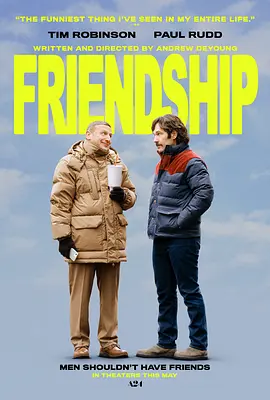
Friendship
Director: Comedy
Cast: Tim Robinson, Paul Rudd, Kate Mara
User Rating: 3.0/10 (100 votes)
Accepted too fast
Read Full Review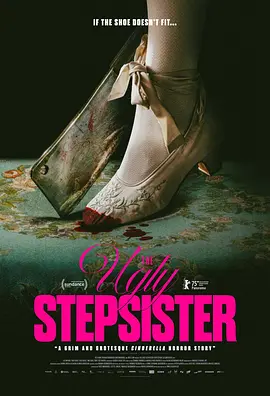
Den stygge stesøsteren
Director: Drama, Horror
Cast: Lea Myron, Thea Sophie Loch Ness, Anne Dahl Topp, Flo Fagley, lsaac Kalmros, Malte Goldinger, Raf Karlsson, Isaac Asperger, Albin Wildenblad...
User Rating: 7.2/10 (3769 votes)
The Ugly Stepsister (B+) This movie really disgusted me, but it is still worth watching! I received an early screening but missed it, so I finally made up for it. I am very glad. The Ugly Stepsister reinterprets the story of Cinderella from the perspective of the stepsister. Not only is the angle novel, the theme is more profound, and the method is bold, with no lack of direct blood and body horror. It is indeed an ancient version of The Substance, with a strong sense of irony. And this is also written and directed by a female screenwriter. I think only female directors can be so cruel to women. Nowadays, only female directors can torture women and satirize their perverted pursuit of beauty. Men really dare not shoot it, otherwise they will be scolded to death. Of course, female directors will never show the ugly faces of men in the film. The overall style of the film is very similar to "Something Substantial". Although fairy tales such as Cinderella and Snow White are for children and have many fantasy plots, they actually contain some dark and scary elements, which are designed to make children feel afraid and alert to bad guys. However, if these scary elements are magnified and the true human nature in the story is further demonstrated, it is definitely the best material for horror movies. Cinderella has the help of a fairy godmother, but how can she become beautiful without a fairy godmother? The Ugly Stepsister can only achieve this through plastic surgery, makeup, wigs and extreme weight loss, which are the "fairy godmothers" in reality. In fact, you already know from the trailer that there will be ancient plastic surgery and bloody scenes, but the film itself has more disgusting and torturous content. Even if you close your eyes and don't watch it, just hearing the screams of the heroine is terrifying. I can only say that if you are unlucky enough to see the scene, you don't have to eat dinner. It does have a weight loss effect. The ancient plastic surgery and weight loss plan in the film are astonishing. Compared with swallowing parasites to make yourself thinner, our current way of losing weight is really not extreme. But the wonderful thing is that even if you know that these cruel methods happened in the past, are exaggerated and unrealistic, people's persistent pursuit of beauty has not changed, but the methods have become gentler. There are still many people like the heroine who look ordinary but are extremely eager to marry into the upper class. For example, the socialite training class that everyone knows is the modern version of this movie. Some people still use all kinds of means to become beautiful and marry rich people or celebrities, from plastic surgery to learning how to seduce men. No matter how well you package it, it is still a scam, and behind it still exposes the ugly heart and perverted obsession with beauty and wealth. So even if the film is exaggerated, it is very realistic, and it is clear at a glance what kind of people it satirizes. The film no longer glorifies Cinderella, the prince, and everyone around them. Instead, it shows people that everyone is a slave to desire and is very selfish. Other people in this story are no better than The Ugly Stepsister. Cinderella is no longer a pure, kind, and unambitious virgin, but can't resist all kinds of temptations; the prince and the people around him are a group of perverts who are eyeing beautiful women, and evaluating women is basically like buying meat in the market. The mother of The Ugly Stepsister, Cinderella's stepmother, completely disregards her self-esteem and her daughter's life in order to please a man, and constantly tortures her daughter in various ways. The environment of all villains is more terrifying than the various bloody and disgusting scenes in the film. The Ugly Stepsister herself, the heroine, is not a simple and kind person, but a jealous paranoid. But she is indeed a girl who has been brainwashed by the utilitarian society and her mother. Under social pressure and the scrutiny of others, she has completely lost her self-awareness and self-pursuit. She only wants to be beautiful and marry a prince. She is so obsessed that she even cuts off her toes for this. If it is said that the foot binding of ancient Chinese beauties was an act of self-mutilation to please men, then cutting off oneself directly has reached a new level. But think about it, even if it is not cut with a knife, women are often very cruel to themselves. What is the purpose? In fact, there are always people who are more beautiful than themselves. If you keep "changing" and "disguising" yourself because of comparison and jealousy, you will eventually become a walking corpse that you don't even recognize. Even if people in modern life no longer need to compete with princes for a ball, there are still many people who compare and envy on social networks all day long and begin to feel ashamed. What I like about this film is that it really didn't make a big change to the original story, but just told more of The Ugly Stepsister. The main story of Cinderella was kept, and there was a grand ball. The protagonist changed from Cinderella to The Ugly Stepsister, which made people see the whole story from the perspective of the ugly duckling who wanted to become a white swan, which really made it more sad and cruel. The soundtrack was very good, and some of the music itself was screaming, which was very scary. Overall, I feel that some of the scenes are really unbearable to watch, but the story itself has a profound meaning and is very ironic, and it also vividly shows the mentality of some people who will do anything and even torture themselves in order to marry into the upper class. PS: At the end, the word "Slut" appeared on the big screen. I was shocked and thought the director was cursing, but later I found out that this word is the Swedish word for "The end". But it really hits the point. Once again, in this era, movies with connotations about women can only be made by women. It's ruthless and makes people applaud.
Read Full Review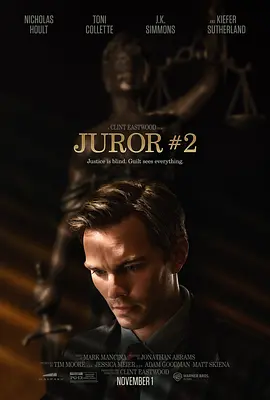
Juror #2
Director: Drama, Suspense, Thriller, Crime
Cast: Nicholas Hoult, Zoey Deutch, Megan Midgley, Toni Collette, Melanie Harrison, Adrienne C. Moore, Drew Scheider, Leslie Bibb, Heidi Nasser, Phil Biedron, Cedric Yarbrough, Bria Brimmer, J.K. Simmons
User Rating: 7.1/10 (11774 votes)
When everyone thought that in his last film, Toki, as the "beneficiary" of the current political context, was going to stage a smug right-wing victory settlement, he actually went the other way and provided some progressive reflections in "Juror No. 2": for example, in the jury, the field where identity politics can be set up the most, the two most "stubborn" defenders of traditional family values (to some extent representing ignorant and stubborn rednecks) are played by black people; and when the defendant uttered the classic scumbag confession "I'm not the guy anymore, I have changed" in the stand, what quickly flashed by was the silent sneer of the two female prosecutors who knew the truth - a typical female subject perspective. In fact, this unprecedented thinking is by no means a trick. As the jury debate deepens, the film seems to be following the classic path of "12 Angry Men" and its many variations (it's funny, the opening scene of the female prosecutor picking up the phone even perfectly pays tribute to He Bing picking up the documents at the end of "12 Citizens"), and the early exposure of the male protagonist's crime breaks this pattern - what Dong Mu tries to do is to put everything in a swaying state. The so-called "rigorousness" has become a prejudice, and the theme of "justice" throughout the film has unexpectedly become a stumbling block to revealing or covering up the truth. This ambiguity takes root and sprouts meticulously all the way until the last scene, when it suddenly changes its form. Through the gaze of the ending, the simple moral binary opposition in "Sully" or "Richard Jewell" is re-exposed. In Toki's values, there is and only one "correct" way of moral narration. On this level, "Juror No. 2" has never hesitated in morality or conscience. This is a firm conscience. For this reason, the skepticism about moral truth in "12 Angry Men" is actually opposed and even abandoned by this film. The last time this kind of complementary and inseparable justice and truth appeared in a concentrated manner seems to be traced back to Fritz Lang (and the day I watched the movie was his birthday). So everything ends with such a gaze that follows the moral values of the black film nearly a hundred years ago. There is no more perfect farewell than this. From the gaze, we see the adhered traditions, ancient ethics and principles, and the fate of this country - after all, don't forget the identity of the male protagonist, he is the most decent conservative white male protagonist in Dongmu's usual narrative, and his evil has been planted from the beginning. Just like the close-up of the scale that appears in the opening animation and runs through the whole film, the old man has completed an atypical patriotic reflection in this way that is consistent with and breaks the self.
Read Full Review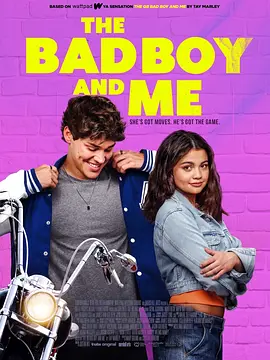
Sidelined: The QB and Me
Director: Drama, Romance
Cast: Noah Beck, Siena Agudong, Drew Ray Tanner
User Rating: 6.9/10 (421 votes)
In the interweaving of light and shadow, we see the diversity and complexity of life. Wonderful movies always touch people's hearts. Whether it is the ups and downs of the plot or the delicate portrayal of the characters, people are immersed in it. Movies are not only entertainment, but also an art. It brings us thinking and enlightenment with its unique perspective and expression. Every movie is like a dream, allowing us to temporarily escape from reality and enter a wonderful world. Good movies are worth savoring repeatedly, and new details and profound meanings can be discovered every time you watch them.
Read Full Review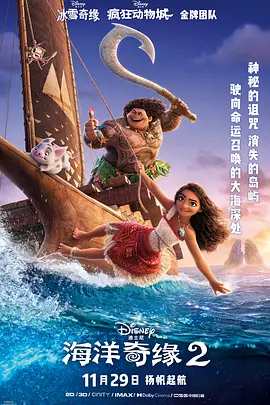
Moana 2
Director: Comedy, Animation, Musical, Fantasy
Cast: Aulii Cravalho, Dwayne Johnson, alalai Chong, Rose Matafeo, David Fahn, More ...
User Rating: 6.6/10 (33322 votes)
The quality of Disney's animation works in recent years is really worrying. The story routine is directly worn as a coat, and the body is also skinny. Every time they make animations, they are free to follow the formula. Encountering difficulties + marching forward + retreating after setbacks + spiritual growth + overcoming difficulties + super happy ending = "Moana 2". This film is even more sloppy and hasty. The main characters have a clear division of labor and lack novelty. The villains have no sense of oppression, and they are just here to play a supporting role, with very little face time. The growth of the protagonist is exactly the same as the first one. Last time, Moana helped Maui untie his knot, and this time, Maui helped Moana achieve sublimation. Both of them drank a sip of chicken soup, but in the final analysis, it is still the same bowl of soup. The only bright spots are the supporting animals, which can make people laugh accidentally, but it's just a laugh, and this is the style of Disney animation. If not, the watchability will be greatly reduced. Comparing "Inside Out" and "Oceans", Pixar is more stable, thoughtful and progressive, while Disney is conservative and will only ruin its reputation. Just listen to the movie songs.
Read Full Review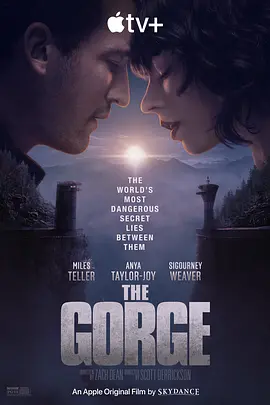
The Gorge
Director: Action, Romance, Science Fiction, Horror, Adventure
Cast: Miles Teller, Anya Taylor-Joy, Sigourney Weaver, Sope Dirisu, William Huston, More...
User Rating: 7.3/10 (70548 votes)
Keep up with current events. The US special services budget was cut by doge, so they hired a freelance mercenary who was short of love. Russia's economy was in a downturn, and in order to cut costs, they hired an ENTP self-employed killer. The whole thing seems absurd, but it actually makes sense logically. Some high-level projects in government departments have been put on hold after a lot of investment but without the desired results. Once the leaders who made the final decision retired or were transferred, no one had the authority to shut down the project, and no new funding could be applied for. A few executive leaders were left to barely clean up the mess, and in the end, there was not enough money for post-maintenance, so they had to outsource the work and hired these two idiots. It was really like drinking soup and spilling it all over your crotch, and wiping your butt and scratching the paper. The two restless people were not like the previous guards who remembered the Cold War hatred and national hatred. They began to pass notes frantically and then to lure monsters frantically. One played music, the other lit up the Christmas tree, and beat drums and gongs just to kill monsters and attract the other side to shoot at them. As soon as they showed their weapons, we knew this was a CP movie. The heroine's main weapon was AKM, while the hero's was M4A1; the heroine's long gun was AXMC precision rifle, while the hero's was Steyr .50M1; the heroine's heavy machine gun was the classic DShK, while the hero's was the famous .50 (Browning M2HB) machine gun. From the weapons, we can tell that they are a strong CP. As for the automatic defense weapons, there is a flaw here. The Americans thoughtfully provided the Soviet side with the Phalanx MK15 Block1B shipborne close-in weapon system, while they used the less high-end M134 minigun on their own side. So it is impossible to kill them at the end of the film. As we all know, dogs never die in this kind of Hollywood movie, and of course, the couple is still considered a dog. Chief villain, you can kill this pair of doomed lovers, but don't do it in a happy love movie that is released on Valentine's Day.
Read Full Review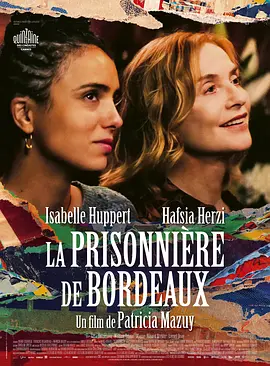
La prisonnière de Bordeaux
Director: Drama
Cast: Isabelle Huppert, Afsia Elch, Noor Elasri, Jean Guerre Souye, William Edimo, Magne-Håvard Brekke, Lionel Delrey
User Rating: 7.1/10 (2380 votes)
9.28 Pingyao The title is obvious. Even if the husbands are in prison, their ghosts (mixed with capitalist economy and patriarchy) still linger in the society where women live - the house. Men are prisoners in prison, and women are prisoners in the house. Therefore, the two women made completely different choices. The noblewoman fled with the artworks, allowing the artworks hanging in the villa to break free from the above discipline; while the poor returned to the prison to visit the prisoner with the spoils of parasitizing the rich, hoping to return to the patriarchal survival order. Although they seem to be completely different, they are actually the upgraded version of "Nora" with different paths to the same destination: artworks are not survival materials. The former may still starve to death if she escapes with artworks; while the latter is the successful begging version of Nora who returns and strengthens the poor family. On this basis, the lesbian elements and the betrayal in the bathroom make girls help girls, a humanistic theme that transcends class and race, generate more reflexive thinking, that is, sometimes people want respect and emotion or material compensation. If the latter is enough, then what is the so-called mutual help and confrontation, and how to do it? Therefore, leaving with the artwork is a metaphorical response to the question of "Nora": after material abundance, can we escape the old gender order, and how do we face the hesitation and meaning loss brought by the deeper new gender order in our hearts. It's like the paintings in those movies. When they are not trapped in the circulation of the art market and the homes of men, how will their value be reflected and where will they go. These movies don't seem to try to respond, but only use a slightly contrasting ending to summarize: the rich escape, the poor reunite. Such an ending does not cater to the current slogan-style network-style "feminist" theme in any sense, but allows this doctrine to self-transform and self-betray under a small ambition, thereby enhancing the overall perception of the movie, which is concise and pleasant. Therefore, it is understandable that its shots and stories are lackluster.
Read Full Review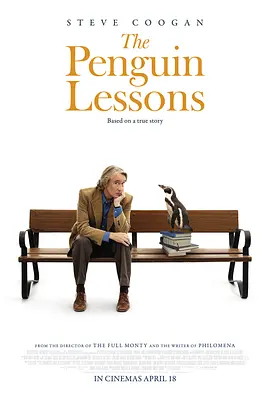
The Penguin Lessons
Director: Drama
Cast: Steve Coogan, Julia Forsey, Jonathan Pryce, Vivian El Jaber, David Herrero, Bjorn Gustafsson, Brendan McNamee
User Rating: 7.5/10 (532 votes)
In terms of form, it is Jean Reno's "My Penguin Friend" + "Dead Poets Society". The story is about the real events of the penguins superimposed on the horror background of the military government, and an artificial warm ending that British movies are good at. This makes people feel that the creative logic of this story is because they feel that the real penguin class story is too thin, so they try their best to add multiple meanings to the existence of penguins. In the end, the penguin became the link between the protagonist and everyone, the emotional food of the students, and the secret weapon to turn danger into safety. At the same time, it also has to bear the protagonist's allusion to his feelings in an unfamiliar environment. This responsibility is a bit too heavy. The film's allusion to the military government is also implicit, and it is not well compatible with the main line. The girl's return in the end is very dramatic, which makes the story have a strong fairy tale attribute. If some choices are appropriately abandoned, and the filming in Buenos Aires (the set of the film is too unsuccessful) may help the film perform better. But then again, the old lady and granddaughter line (although it may be purely fabricated to a large extent) is still delicate and makes people cry.
Read Full Review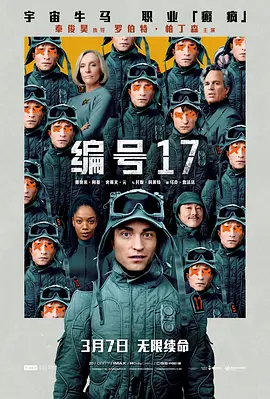
Mickey 17
Director: Drama, Science Fiction, Adventure
Cast: Robert Pattinson, Naomi Ackie, Steven Yeun, Mark Ruffalo, Toni Collette, More...
User Rating: 6.7/10 (78790 votes)
I finished watching the movie No. 17 today. The overall conclusion is that the censorship made this Bong Joon-ho movie, which started out with a score of 8.5, become about 7.5, but smart audiences can still accept the essence of the whole movie. Note! The censorship I'm talking about here is not the deletion of pornographic/bloody scenes in China, but the censorship of film investors; and I don't know who the censors are. Censorship is not uncommon for Hollywood movies. For example, the film producer Warner forced the Wachowski sisters to shoot The Matrix 4 (which turned out to be a meta movie). I found that the tone of the first 2/3 of the movie is very different from the last 1/3. If you regard the narrative style as a human face, these two parts are two completely different faces. The first 2/3, except for a few laughs, is very Bong Joon-ho and very Snowpiercer (Welcome to read my Snowpiercer movie review: How do you evaluate the movie Snowpiercer?). Various plot foreshadowings pushed the audience's expectations to a peak, but the last 1/3 fell down. The metaphors and plots foreshadowed were not recycled, and it led to a childish ending. Based on my experience of watching the film, this is almost certainly the result of an internal struggle. But if we assume that there is a game between Bong Joon-ho and the investors, and bring this game into the film as a meta-narrative, the film will be more interesting . The film is scheduled to be released in North America on March 29, 2024.[17] On January 10, 2024, Warner Bros. announced that the film would be withdrawn due to delays in post-production. The new release date will be announced at a later date. All the following comments contain spoilers. If you don’t want to be spoiled, you can come back after you finish watching the movie. Next up is the official movie review. Bong Joon-ho is a high-concept director who is best at making political metaphors. "Number 17" is undoubtedly a political metaphor movie. The quality of metaphors in "Number 17" is also very good, maintaining the tone of Bong Joon-ho's "Snowpiercer", and using one or two special details to outline the entire worldview. Let me give you an example. When the male protagonist signed a contract to become a "consumable" for the interstellar travel team to collect debts, the signing hall was full of poor people. The poor people lined up one after another, like zombies (like Yomi Hirasaka in Seiya), walking up a spiral staircase shot from above, and waited to go to the top floor to sign. Suddenly, the wind and sand picked up outside, and then the hall played an advertisement for anti-dust masks. From this ten-second scene, we can see the era setting of the movie: Technology is highly developed, and interstellar travel is already possible The Earth's climate is on the verge of destruction, and humans have become accustomed to sandstorms. The social economy collapsed, so the underworld and loan sharks became rampant again. This collapsed society is completely controlled by capitalism. Even job applicants can only buy anti-dust masks at a 95% discount. This kind of information-dense shot appears repeatedly in the movie, and the high-concept world view setting of the whole movie is more interesting than the story itself. This is the Bong Joon-ho I am familiar with, and this movie is undoubtedly his masterpiece. But! But it is obvious that this "film written and directed by Bong Joon-ho" has a very obvious political mission, which is to be anti-MAGA and prepare for the US election . For example: The film's sci-fi background is interstellar colonization, reflecting Musk Hulk actor Mark Ruffalo undoubtedly mirrors Trump in his performance. MAGA symbols appear everywhere in the movie, such as red hats, and are repeatedly mocked. The second half of the film inserts various "deliberate" political correctness, such as deliberately emphasizing LGBT, women's power, etc. I don't need to spoil more of the other points. It was definitely unexpected that this movie was released after Trump's victory. It was obviously a bullet in the campaign, including the irony of the villain Marshall "So you lost the election twice"! ! But the reality is that Trump, who was ridiculed, won the election. This bullet flew for too long and became a joke. Even the scene in the movie where Marshall, who alludes to Trump, is assassinated and has a bullet grazing his face, I reasonably speculate that it was re-shot after July last year. From the beginning (No. 17 returns home) to the whole scene of shooting Marshall, the scenes switch back and forth, and the narrative focus (the clones also have to compete for me in social relations) has also obviously changed. The transition is paved with watered-down jokes (two women discussing the division of two men), and the plot advancement is extremely illogical. If the only goal of this movie is to be an anti-MAGA metaphor, and it fails miserably and slaps itself in the face - then Bong Joon-ho becomes a thug of capital, and a failed thug at that. Too low! But I clearly saw a political metaphor in the first 2/3 that was far more complete than anti-MAGA - it was still Bong Joon-ho's consistent theme, anti-capitalism, and opposition to capitalism's alienation of human beings, especially workers. The normal narrative logic of the movie should be completely centered around the sci-fi concept of "Expandable" (consumable humans), just like the titles of "Snowpiercer" or "Parasite". The plot logic I originally saw should be: As a "consumable", the protagonist is completely alienated, and as a human being he is not treated as a human being. The audience began to wonder what kind of people would choose to become "consumables" Economic poverty and bankruptcy (similar to "Parasite") is the protagonist's superficial motivation for being consumables The subconscious motivation for the protagonist to be consumable is that he believed that he had killed his relatives when he was a child. Believing that one has original sin, and therefore accepting that one is being exploited, is one of the most common entry points for Bong Joon-ho's anti-capitalism. Mickey 17 survives by chance and forms Multiple (together with 18), which is the turning point of the drama. Exactly the same as the excellent work "Moon". Multiple causes the two Mickeys to start competing for social relationships (such as the same lover), and the war of "all against all" escalates to "all me against all me" (Marxist metaphor) In the process of fighting against his other self, Mickey 17's subjective consciousness awakened and he began to "not want to die" It turns out that the two "I"s, No. 17 and No. 18, are not mortal enemies. The capitalist logic that created them (completely alienating humans into labor) is the culprit. Mickey realized that his original sin should only punish himself, and the logic of capitalism that made him suffer was actually making everyone suffer. So he could no longer accept being exploited. ………………Bong Joon-ho’s classic masterpiece……………… Mickey breaks free from the capitalist chains that bind him, and at the same time finds spiritual liberation from his original sin. The story comes to an end. ………………Bong Joon-ho’s classic extremely cold and dark ending……………… In other words, "anti-MAGA" was probably the topic of the investor's essay, and Bong Joon-ho just happened to use it as a sci-fi background. His story was not prepared to be anti-MAGA at all. But it is very obvious that the quality of this movie's plot has declined rapidly since episode 8. All the foreshadowing has been disconnected, and the emotions are not connected. Episodes 9 to 13 have completely become anti-MAGA + white left plots, which can be said to be very childish, not to mention being slapped in the face by reality! In other words, in "Number 17", it was Bong Joon-ho's turn to dance on swords and experience the story of the Wachowski sisters when filming "The Matrix 4". But The Matrix 4 is still a masterpiece for me, the best "meta-narrative" I have ever seen. The directors fully integrated the oppression of the investors and their own incompetence and powerlessness into the plot and intertextualized with reality. The directors kept blowing the dog whistle and blinking their eyes, wanting the audience who could understand the dog whistle to know that although their bodies were kidnapped, their spirits would not be kidnapped. So, is there any dog whistle from Bong Joon-ho in "Number 17"? Haha, that’s right. This is actually the biggest highlight of the movie after it collapses in the second half. The movie seems to be anti-MAGA, but in fact it is anti-Zionism. It reveals a little bit of information in the repeated twists and turns. It is so vivid! First of all, the original sci-fi setting of "Number 17" is a fusion of the Great Flood (the earth is on the verge of destruction), the Exodus (the interstellar ark), and finally God's people came to the "promised land" and lived a fairy tale life of "happily ever after". It's just that this process should not be led by MAGA. The ending of the final version of the movie is also the same. However, this interstellar journey that Bong Joon-ho put together with metaphors is full of anti-utopia, for example: Snowpiercer-style cockroach energy cubes When faced with danger, the employees crawled into the sleeping cabins in the cracks of the wall like cockroaches in "Parasite" Following this tonality, the ending will either be like: Snowpiercer-style ending, bombing the state that causes the historical cycle, when the day comes, I will die with you The ending of "Parasite" is like that of the male protagonist who kills people because of his rebellion against the success theory. His son is instead shackled by the spiritual shackles of the success theory in order to save his father. How could it be happily ever after? The nightmare that was glimpsed at the end of the movie did not assume a "second hidden ending" (a low-level conspiracy theory), but was more like the airport battle at the end of Tsui Hark's "Taking Tiger Mountain by Strategy". This is just a low-level dog whistle. The movie's truly high-level dog whistles are: Everywhere it is hinted that Marshall, the MAGA-style populist leader, is being manipulated. The team operating him is the "church", but as a businessman, Marshall believes that he works for the "company". The church's logo only appears for 0.5 seconds, and it seems to be a variation of the Masonic logo. The bald photographer who had been sucking up to Marshall was the "pastor" who mentally controlled Marshall. This mysterious "church" (similar to SEELE in "EVA") is dedicated to finding the "promised land". After arriving on the planet, the bald "pastor" repeatedly encouraged Marshall to start a massacre first and then go to his death. None of these foreshadowings were recovered at the end of the movie . They all became waste. But we can see Bong Joon-ho's original design: The MAGA leaders are just puppets of a certain Zionist secret religion. This group of people has been plotting behind the scenes, using capital to manipulate political leaders to practice their own beliefs; they use the manipulated populist leaders to help them carry out massacres, clear out the foreigners in the "Promised Land", and then replace these MAGAs as the masters of the "Promised Land". This dark plot should have burst out together with the bright plot of the male protagonist breaking the mental shackles at the end of the plot, complementing each other. But both plots disappeared! OK, let's stop here for the analysis of the movie. After all, I only watched the preview once, so I missed a lot. This split movie is neither a bad movie nor a good one. But if you also understand the reasons for the split plot, the secret game between the director and certain forces, doesn't it become interesting?
Read Full Review
Kyuka: Before Summer's End
Director: Drama
Cast: Elsa Lekakou, Konstantinos Georgopoulos, Simeon Tsakiris, Elina Topalido, Stathis Apostolou
User Rating: 7.1/10 (948 votes)
The square frame cannot contain the overflowing blue waves at the end of summer in August and September. There are too many ambiguous backgrounds and too many vague words. Only the real emotions and silent blanks revealed by the words and interactions can make people resonate with them. The father, who is both a father and a mother, took his twin children on a sailboat to a beach where he often took them when they were young, and also went to see his ex-wife whom he had not seen for many years without the children's knowledge. God knows how excited and expectant he was on this day, but he still guarded his pride as always, arguing with her half-heartedly, and carefully handed over the USB flash drive he specially prepared with the children's video recordings. He wanted her to know how he had diligently raised the children during her absence. Although his ex-wife broke her promise after seeing him, he still invited her family to his boat by coincidence, and had dinner with the children - they ate the fish he caught with his superb fishing skills. Another fisherman, his ex-wife's husband, who was also good at fishing, exposed him and said that all the fish were bought from the market. His last sense of honor was punctured, and his broken marriage experience, the parent-child relationship that could not be honest with each other, and the fact that he could not catch any fish made him sink into the sea with his boat in vain. The only lifeless dead fish caught by his daughter on this trip was actually the fisherman himself. As for the close twin brother and sister (or sister and brother), except for a turtle of the same age as themselves, the memory of their mother has long disappeared. The mother is absent, the father is taciturn, the two are partners, laughing and playing, with a single-parent family history that is not worth mentioning behind them and a useless youth that knows nothing in front of them. They are the brownies that are bitten into the mouth and then spit into the sea in disgust, the broken shells picked up by a five-year-old girl on the beach, and the deflated rubber boat without a shore in the Saronic Bay in the western Aegean Sea. Although they had stopped asking about their mother's whereabouts, when they realized that the woman in front of them was her, they waded across the shallow sea and tried to climb ashore on the boat called mother. The younger sister finally gave the boat ticket to the older brother. She thought that this older brother who liked skirts and nail polish should be more liked by the mother who still had charm. On the last day of summer, with a bright moon hanging high in the sky over the Saronic Bay, one ship set sail and another was fished out.
Read Full Review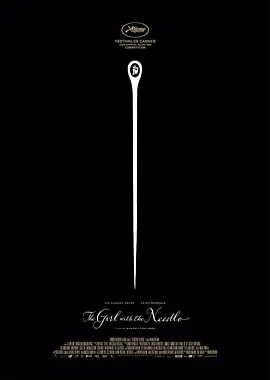
Pigen med nålen
Director: Drama, Thriller
Cast: Victoria Carmen Sonne, Trina Tihon, Bethel Zessili, Ava Knox Martin, Joachim Fjelstrup, Tessa Hoder, Søren Hitter-Larssen, Thomas Kirk
User Rating: 7.4/10 (4942 votes)
Originally named "Dogmar the Killer", Danish serial killer Dogmar Overby killed 9 to 25 illegitimate babies entrusted to her care around 1918 under the guise of a childcare worker. In the film, she was adapted into a candy store owner who helped those who could not raise their own children during the Great Depression of World War I to kill their babies. The director was not interested in retelling a biopic about a serial killer. The film shifted the narrative perspective to a victim (participant) mother in the Dogmar case, a weaver girl, the owner of the needle in the title, but that was not her production tool. The film transforms from a simple biographical film into a dark fairy tale about forgotten and abandoned people, depicting the Gothic appearance of Copenhagen at the end of World War I: widespread unemployment and scarcity, scarce job opportunities, people disfigured by the war who can only play monsters in the circus, abortion is regarded as a sin, pregnant women are expelled from factories, and many illegitimate children with no future try to find a ray of hope in the iron-clad ethical society. The film uses the method of horror films to outline the plight of women who have no future, no backup, and no escape options. Because of this, Dogma, who has been tempered by life and is also broken, but still has humanity, is a fatal attraction to Zhinu. For her, it is easier to dance with the devil than to love her husband torn apart by war or a weak young master across classes. An expressionist nightmare that reveals the devastating truth hidden behind the veil of civilization.
Read Full Review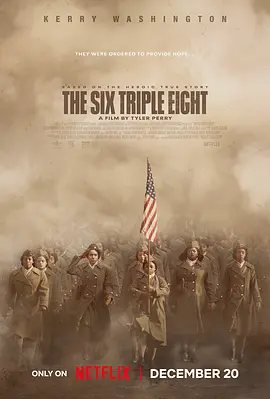
The Six Triple Eight
Director: Drama, History, War
Cast: Susan Sarandon, Kerry Washington, Dean Norris, Sam Watson, Oprah Winfrey, Sarah Jeffrey, Greg Sulkin, Milana Jackson...
User Rating: 6.6/10 (1104 votes)
The film is based on real people and real events. This is a big plus. People who experienced World War II are basically centenarians, and they will soon die out. Watch it and cherish it. Because it is a true story, there is no bragging, and love is a secondary issue. There is nothing too legendary. Death is death, and people die with a snap... A few highlights: Officers have the Women's Army Corps' Athena insignia. Soldiers have a different insignia. Before joining the army, women knew how to dress well. After joining the US Army in 1943 and the GI Bill passed in 1944, women soldiers were treated the same as men and did not have to go to the front lines, which was actually very good. But only those who were well-informed understood the significance of it. These people were well-educated, and there was no shortage of young ladies to gild their reputations. The transformation of the fat girl, especially the surprise at the end. It is not denied that Roosevelt wanted votes, the army wanted manpower, and the female soldiers wanted benefits. Previously, the treatment of the women's corps was very poor. After becoming a regular army, female soldiers are treated the same as male soldiers (including food, clothing, housing and transportation). Private soldiers can get an annual salary of $600, and skill badges can add several dollars, which is much higher than the average income of women of $525. The amount of food supplies is the same as that of male soldiers, so they are sure to have enough to eat. After retiring, the country can pay for college tuition. After World War II, many people went to college and made their own lives. In addition to traditional nurses, clerks, typists, switchboard operators, and initial positions, female soldiers will also be selected to participate in technical work, mechanics, drivers, ordnance and other departments, and even participate in the Manhattan Project. But most of the life-threatening situations are very limited. So if someone really died, it would be a big blow to morale. As for the black sisters, their abilities are definitely not trusted. But there is one advantage, because the Nazis discriminated against blacks, there must be no Nazis or spies mixed in... So they are very suitable for handling letters... It is understandable that they open letters privately. The movie itself is a formulaic military education film. The civilians are busy, determined to join the army, the boot camp is full of troubles and they have to quarrel with their comrades, then the rookies encounter difficulties in the first battle, and after education and a certain event, they are refreshed and grow into heroes. Finally, there is the epilogue. If you are lucky enough to listen to the veterans talk about World War II, they are basically fragments of obscure history. Most people are on low-intensity duty most of the time, just a job, and die randomly from diseases, bombings, accidents... (Those who continue to participate in high-intensity combat, even if they survive, will be affected both physically and mentally, and rarely live long. Soldiers usually march, dig trenches, and stand guard. When fighting, they just listen to the officers and fight. Some people don’t even know where they are. Although those in high positions have an insight into the overall situation, most of the time they are just doing map work, making phone calls, cursing, and looking for people to eat.) There must be some highlights in life. They become treasures in an ordinary and boring life. Many years later, you still often recall your college days or military service years... (then your life is quite boring). If you are lucky, there are many highlights, which are always your greatest treasures when you are tired or insulted. War is a manifestation of human stupidity. However, war forces the survival of the fittest, screens out the stupid and weak, and allows the brave and hardworking to gain more. So what? (The politically correct people who are now lying and taking bribes are nothing compared to these pioneers)
Read Full Review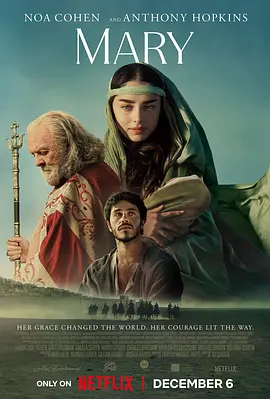
Mary
Director: Drama
Cast: Anthony Hopkins, Noah Cohen, Ido Tacco, Shila Vidor, Stephanie Noor, Gudmundur Thorvaldsson, Olli Pfeffer, Milo Djurovic, Mila Harris
User Rating: 6.0/10 (644 votes)
The costumes and props seem very delicate, but that's all. The core of the film's story is completely nonsense. The film's description of the sacred religion has neither the logic of God, nor the logic of man, nor the logic of history. The film simply and crudely caters to the legend without thinking about it, so that the characters have no growth, few deeds, and the suffering is false. It also seems to be whitewashing ancient Judaism. Although I don't believe in religion and only have a little understanding of religious history, I can see that this film is not sincere. Not only does it lack real religious content, but some of its content is contrary to its religious history. It is a product of political correctness from beginning to end.
Read Full Review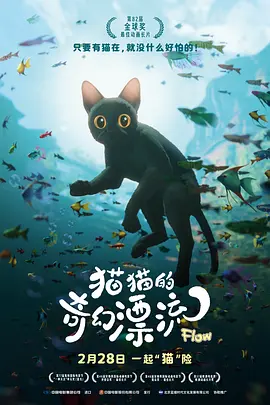
Straume
Director: Animation, Fantasy, Adventure
Cast: /
User Rating: 8.4/10 (125626 votes)
Flow is actually a very sad story. The aurora borealis appears in the tropics, floods come and go without a trace, survival is threatened at any time, and beloved things can be lost at any time. The galloping reindeer carries the message of the end of the world. In the cat's nightmare, it is an endless cycle, indicating that all life in the end of the world has nowhere to escape. The herd of deer roaring past again at the end is probably the precursor to the nightmare coming true. But why does this cartoon look cute, warm, and healing? Because the ignorance from the perspective of animals conceals the anxiety of survival in the end times. The black cat, Capybara, Labrador, lemur, and secretary vulture, these five animals carefully selected by the production team, do not have a predatory relationship with each other; except for the black cat and Capybara who are born to live alone, the other animals have either actively or passively left the group and lived in harmony on the "Noah's Ark", and even pulled each other and helped each other, which cast a layer of warmth on the end-of-the-world picture. And every time you stumble, you can always be caught by the kindness of other species, and every time you lose something, you will always get it back at an unexpected moment, as if nature also has some kind of mysterious warmth. Applying color on the background of sadness and despair, this is the unique healing power of romanticism. In this romantic drift, each animal pursues its own life agenda on the Ark. Their demands are intertwined, and each takes what it needs. The Ark becomes their small life community. Lemurs love the creations of human civilization. The magical transparent utensils (glass bottles), the hard and luminous regular devices (silver spoons), and the most fascinating magic that can show another self (mirrors) make lemurs crazy. The Ark is like a scale for lemurs. On one side are its treasures, and on the other side are life and death, and companions. It had two chances to return to its own tribe, but it gave up. Perhaps it realized that its own kind only love material things, and the alien companions on the Ark are the real belonging that can be pinned on. The secretary bird wanted to be in control. Because it insisted on carrying out its good intentions (protecting the cats), it fought with the leader, but was defeated, had its wings crippled, and was abandoned by the tribe. For the secretary bird, the Ark was like a power vacuum, and it naturally became the helmsman, the new temporary authority, and could act according to its own will. When the dogs boarded the ship, when things were beyond its control, it was the first to abandon the ship. Labrador longed for a master. The dogs that returned to the wild lost their allegiance and were fighting for their own survival, seemingly inheriting the dark side of both human and animal nature. Labrador's separation seemed to be due to the traces of domestication remaining in its body, and it tried to find the shadow of its master in the creatures of the Ark. It begged the secretary bird to play the parabolic game with it, imitated the movements of cats, wagged its tail, begged for food, and guarded everyone's sleep, and stayed with everyone until the last moment. Capibala is indeed selfless, it teaches everyone to give in to each other and live in peace, and there is nothing more important than eating and sleeping. In fact, Capibala is like the ark itself, and in the story it almost lives and dies with the ark - the first to board and the last to leave. Although cats are the absolute protagonists, their demands are the most ambiguous. If for lemurs, secretary birds and Labradors, the Ark is a place of belonging outside the tribe, and drifting is a practice of idealists, then for cats, what are the Ark and drifting? On the surface, the cat is the same as other creatures, except that it has never belonged to any group, so it just went through a process from being alone to having a partner, and finally ended up with everyone else, belonging to a sense of belonging alliance composed of different races. The film begins with the reflection of the cat in the water. This intention appears many times in the film. Before the danger comes and after the danger is gone, the cat looks at its reflection. Obviously, it is not Narcissus-like self-admiration, but it seems to have some loneliness and self-pity of a loner. At the end of the film, the reflection in the water is no longer a single person, but a family portrait. But if you think about it carefully, the bond between the cat and other animals is actually very limited before the final rescue scene. The role it plays on the ark is very unstable. When necessary, it will steer the rudder and catch food. When conflicts occur, it often even stays out of the event. So I tend to think that for cats, this drift is not only about finding a sense of belonging as a social animal, but also about seeking a sense of belonging as a solitary animal. Specifically, it comes down to the issue of human settings and religious symbols. Although the film does not explain the human part, we can judge from the ruins that human civilization has probably developed to the level of ancient Rome, with a venue that can accommodate thousands of people, a pillar like a holy mountain, and cat statues of various models around the human hut where the cats originally lived. Is it some kind of cat worship, or the owner of the house just likes cats very much? It is not even known what the relationship between the animals here and humans was, such as whether the dogs were domesticated dogs by humans, and whether the cats themselves were fed by the owner of the house. But it is obvious that humans have either become extinct or have evacuated the earth in a mysterious way similar to the collective disappearance on the holy mountain. Regarding religion, the most recognizable element is Noah's Ark. However, unlike the betrayal-faith, punishment-forgiveness, disaster-salvation, destruction-rebirth symbolized by Noah's Ark in the Bible, the Ark in this film is more like a temporary, even one-time place, a refuge for survival in the end of the world, and a private reserve for idealists who avoid materialism, barbarism and authoritarianism. Rather than calling it "Noah's Ark", it is better to say that these animals are all abandoned by Noah and left on the earth by humans to fend for themselves, so the animals themselves formed a small boat for self-rescue. It is spontaneous, temporary, and unstable. There is no punishment or blessing from God's will, but only the coldness and kindness from the unknown forces of nature; there is no promised land of hope, but some are signs of the next flood; of course, there is no Noah-like leader or organizer, but only a spontaneous alliance of animals. Of course, the Ark always symbolizes hope, but this hope is eventually destroyed. After the flood receded, the once hopeful Ark became a dangerous place and fell into the abyss before the next flood came. The second thing that can be detected is the divine implication of the secretary vulture. Since the secretary vulture took the helm, the Ark seemed to be heading purposefully towards the tallest building in sight, those towering mysterious pillars, or holy mountains. The holy mountain is a sacred image that appears in many religions. It is the abode of God and a place where one can communicate with God. In the end, the secretary vulture disappeared from the center of a mysterious formation on the holy mountain, but the cat fell back to the ground. God accepted the secretary vulture but not the cat, or the vulture found its ultimate home, but this did not constitute the ultimate home of the cat. Therefore, for the cat, humans and all possible bonds between humans and cats are not their destination. The gods guided by the secretary bird are not their destination either. The peace and love alliance between different races advocated by Capybara seems to be the destination given at the end of the film, but in fact it is unlikely to last forever. In this sense, the deeper sadness of the film is revealed under the apocalyptic atmosphere: the answer that the cat finally sees is that there is no destination. Even the mysterious kindness from nature is not a destination - the giant whale that saved them twice was finally stranded on the flat ground where the flood receded and was dying. The cat witnessed its death with his own eyes. The kindness between animals is so touching in the background of sadness. In the hint of despair, the family portrait reflected in the water, and the giant whale entering the waves under the sunset after the subtitles rolled, are the echoes of true romanticism. Of course, the cat in the film, as an animal, does not actually have the subjective consciousness of seeking self-meaning and ultimate destination, but the self-image that appears again and again in the water seems to imply the meaning of self-care, although this meaning is quite vague and ambiguous. This brings us to the biggest problem of this film - the improperly placed human perspective. No dialogue, no anthropomorphism, and a completely animal perspective are already very fresh innovations in today's world where Disney and Hollywood animations are dominant. In particular, there is no extra explanation of the whereabouts of humans, which is a very restrained and subtle treatment, which largely supports the credibility of the animal perspective. However, the animals in the film are far from real animals. Although they are not anthropomorphic in body, expression, movement and language, they do have both animality and human nature, and the animality among them is very human. For example, "dog nature" is equal to liking to play parabolic games, and "cat nature" is equal to liking to chase light spots. The "camera" in the film sometimes takes the subjective viewpoint of cats, but most of the time it follows the cats like an intelligent tracker, which is very much like the viewpoint of a natural photographer-the viewpoint of humans peeping at animals. Therefore, the whole film has a kind of embarrassment of wandering on the border of "animal world", "cute pet world" and "animal fable", not knowing where to land first, and the audience will feel confused between the sense of voyeurism and the sense of substitution accordingly. However, after all, the audience is all human, and the anthropocentric perspective problem between humans is probably easy to forgive. What's more, this is such a beautiful but not greasy, sad but not hurtful, simple but not simplistic cat adventure. Moreover, who doesn't love a doomsday healing road movie these days? Who hasn't been at the end of their own world? Who doesn't want the leap of faith they are forced to take to be caught by warm kindness? Who doesn't want an ark to accommodate their idealism? Therefore, since both the desire to voyeurism and the sense of immersion can be satisfied at the same time, as a viewer, there is no need to worry about anything.
Read Full Review
A Complete Unknown
Director: Drama, Music, Biography
Cast: Timothée Chalamet, Edward Norton, Elle Fanning, Monica Barbaro, Boyd Holbrook, More...
User Rating: 6.5/10 (12791 votes)
Although the film is adapted from Elijah Wald's "Dylan Goes Electric!" and the narrative is based on Dylan's groundbreaking (actually farcical) electric performance at the 1965 Newport Folk Festival, as a Dylan fan, what touched me most after watching "A Complete Unknown" was Sylvie Russo - yes, this is a pseudonym in the film, and she is actually Dylan's early muse, Suze Rotolo, the beautiful and playful girl on the cover of the great The Freewheelin' Bob Dylan. Rock fans are familiar with the story of Suze Rotolo, including her autobiography "The Time of Letting Go", which was translated into Chinese by Chen Zhen many years ago, and Dylan's description in "Chronicles", which together outline the time that young Dylan spent in Greenwich Village, New York. Although the role of Suze was adjusted in "A Complete Unknown", such as Suze never participating in the Newport in 1965, not to mention the plot of their farewell across the iron fence, including the ambiguous description of Dylan and Suze's breakup in the movie (an important point is that Suze was pregnant with Dylan's child, and they eventually decided to abort together, which was an inevitable link in the collapse of their relationship), these adaptations in the movie partially protected Suze, and also protected Dylan, who is still alive this year at the age of 83, and Joan Baez, who is 84 years old. On the other hand, these adaptations are quite successful in my opinion, and they supplement (actually confirm) my conception of the young Dylan at that time as a Dylan fan. There were three scenes, three times when Dylan sang, and Sylvie Russo (let’s keep calling her by that name) in the audience touched me: The first time was when Dylan sang "A Hard Rain's A-Gonna Fall." At this time, Dylan was already a rising folk star, and when he was recognized by fans, he quickly got into the car (a tribute to the Beatles' hard day life?). Sylvie, who appeared on the cover and was probably the happiest girl in Greenwich Village in the eyes of the outside world, was in the audience. She swallowed her saliva and then showed a relieved but bitter smile - at this moment, Sylvie knew that Dylan no longer belonged to him. This was the first time I cried in the movie. The second time, in Newport, Dylan sang The Times They Are A-Changin, with guitar, harmonica, hoarse voice, and the fans singing in chorus. This was the strong sound of the American era in the 1960s, and it was also the sound field that Dylan wanted to break away from later. At this time, the camera was given to Sylvie again. At this moment, she already knew that Dylan had created "the Dylan in everyone's mind". She knew Dylan's true character and knew that Dylan would definitely break this. Even Joan Baez in the backstage showed a meaningful expression: This bastard will not stop for anyone, including himself. The last time, yes, is the climax of the film, It Ain't Me Babe. In the film, Dylan and Joan Baez seem to be singing this song sweetly, But it ain't me, babe, No, no, no, it ain't me, babe, on stage like a couple, flirting, constantly denying and affirming each other - in fact, in the real world, Dylan and Joan sang this song in 1964, and in the film, it was a transplant in 1965, and the relationship between Dylan and Joan was also tangled. I like this part very much. Sylvie knew before the song was finished that Dylan was a complete jerk. Don't hold on to your illusions, let's go, don't be blinded by his talent. Although many viewers will think this is a love scene, in my opinion, Sylvie is the earliest prophet. She predicted the greatest chameleon in the history of pop music, who would use one sincere lie after another to ruthlessly betray herself again and again. Finally, what Sylvie said, "He has a lot of people to talk to," which confirms Dylan's famous saying, "For me, it's harder to sing to 50 people than to 20,000 people." After watching the film, columnist Darryn King thought that Elle Fanning 's interpretation of Sylvie was not good (shit), but he still wrote in his Forbes article that Rotolo left "a wrenching record of the emotional costs of fame (from the perspective of a victim) and, of course, a penetrating portrait of Dylan's transformation from folk-singing jerk to, well, jerk and global icon." You're right, Dylan is a complete asshole. However, in the movie "Nobody", the director chose to use a simple and understandable emotional line to replace Dylan's reason for tearing off the label of being the flag bearer, and finally leading to the film. Although this adaptation seems to be dramatic, for Dylan's fans, as I said before, it is reasonable. Anyway, there is nothing we don't know about Dylan's little things. As for those viewers who are not familiar with Dylan, they may find it inexplicable, what is so interesting about the story of a scumbag, etc. This can only be a choice. Anyway, Dylan's catchphrase is, it's none of my business, I'm not there.
Read Full Review
Dog Man
Director: Comedy, Action, Science Fiction, Animation, Family, Crime, Fantasy, Adventure
Cast: Peter Hastings, Pete Davidson, Lyu Bo, Lil Rel Howery, Isla Fisher, Billy Boyd, Ranuma Pansazi, Maggie Wheeler, Lunell Campbell...
User Rating: 7.1/10 (1103 votes)
Although it is a fan-oriented movie, it is very carefully produced. Not only is the painting style restored synchronously, but it also successfully presents many scenes and essences of the original comics, including the stories, lines and even backgrounds of multiple books that appear in the film. From time to time, the comic dialogues are directly drawn into the film across the dimensional wall, which is very creative. To be honest, Detective Dog is not easy to adapt. Although it is one of the most popular comic books among young elementary school students in the United States, teachers and parents have always had different opinions on it. But the director is very capable. He has achieved a smooth story line based on the collection of multiple stories. Some plots are even tear-jerking, and he grasps the three views in a simple and straightforward way: "We will be stupid and do bad things, but the kindness we release will eventually be treated gently by the world." It can be said that it is a rare popcorn movie for children that is easy, funny, positive and warm. Disadvantages: 1. Fan-oriented movie, pure American style, you may not get the fun and laughter of the story if you haven't read the original book. 2. It is suitable for children who still have a lot of strange ideas in their minds. Older children may find it childish/nonsense/inexplicable.
Read Full Review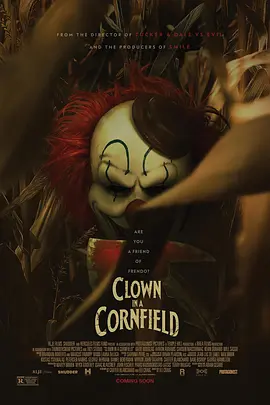
Clown in a Cornfield
Director: Slasher Horror, Dark Comedy, Teen Horror, Horror
Cast: Katie Douglas, Aaron Abrams, Carson MacCormac
User Rating: 3.0/10 (100 votes)
Saw the opening voice-over: “I love men and the only thing better than one man is two men when they’re touching and kissing each other.”
Read Full Review